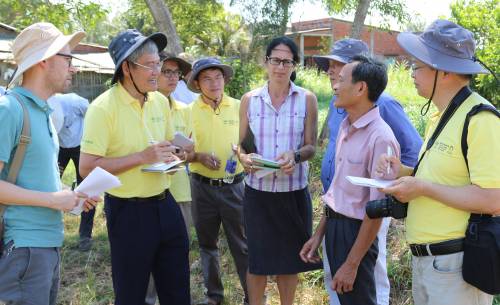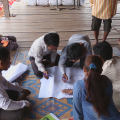Our work on "water insecurity": Dr Hoanh, Chair of SUMERNET explains

Dr. Hoanh (second from left) has been involved with SUMERNET's work on research and policy engagement in the Mekong Region for more than ten years. He is presently the Chair of SUMERNET's Steering Committee (SC).
Q: How long have you been involved in SUMERNET? In your view, what is the key strength of SUMERNET given there are so many environmental networks in the Mekong Region?
A: I have been involved in SUMERNET since the Phase 1 of work in 2005. The key strength of SUMERNET is the close partnership that has been established over the last decade with many research and policy institutions as well as media, civil society and local groups who have all come together to address the common regional problems in the Mekong River Basin.
Q: SUMERNET has embarked on a new phase to work on “water insecurity”. Can you explain the rationale behind this decision?
A: During the last ten years, the Mekong Region has witnessed intense and irregular floods and droughts due to the impacts from climate change and development in the Mekong Region. These have affected the living conditions and production activities of people in all the countries of the Mekong Region. Therefore, our discussions in SUMERNET lead to the decision to look at issues surrounding “water insecurity” so that we can better support the people who are facing numerous social and ecological challenges.
Q: What does this concept of “water insecurity” mean in actual practice or on the ground? What kind of areas will SUMERNET be involved in, and will this be much different from previous phases?
A: The concept of “water insecurities” is to help SUMERNET work focus on addressing a range of issues of both quantity and quality of water and the impacts on the livelihood activities of people. Our vision is to reduce water insecurities for all, in particular the poor, marginalized and socially vulnerable groups of women and men in the Mekong Region.
Compared with the previous phases of SUMERNET, in this phase we intend to look more in-depth into also the transboundary impacts of water-related development, water disasters and seek development alternatives for local communities. We are also having a special focus on groundwater, in particular, the long-term environmental impacts of groundwater exploitation for agriculture and industry.
Q: SUMERNET has had a long experience working on environmental issues in the Mekong Region. What do you think is its biggest success?
A: The biggest success of SUMERNET has been the building of an active network of more than 100 partners in the Mekong Region and outside who are closely working on research and policy engagement to support policies for sustainable development in the Mekong Region.
Q: It seems the number and severity of environmental problems from dams to pollution and destruction of river ecosystems has increased in the last 15 years. What is your main message for young people in the Mekong Region working on environmental issues?
A: My main message for young people on environmental issues in the Mekong Region is that development always includes trade-offs. We cannot expect a development project to only make a positive contribution without also losing something especially in the long-term. Therefore, we need to carefully consider the long-term impacts of development on society and the environment, and not just within our own localities but both upstream and downstream. We need to look at the effects not only on the people in our own community but also across borders. We need a transboundary outlook to make development genuinely sustainable in the Mekong Region.
Info
This story is part of the following project
SUMERNET 4 All: Engaging with water insecurity in the Mekong Region
Country
Related people
You might be interested in
-
SUMERNET Vision Guide introducing the new phase "SUMERNET 4 All"
The new, revised "Vision Guide" for SUMERNET is now available. This vision guide presents an overview of SUMERNET - its origins and governance structure, background to the network, aims, key research areas, engagement with policy, and outreach products
![SUMERNET Vision Guide introducing the new phase "SUMERNET 4 All"]()
-
SUMERNET 4 All Call for Proposals on Joint Action
SUMERNET 4 All (S4A) provides financial support and technical assistance to consortia of researchers and boundary partners from the Mekong Region
![SUMERNET 4 All Call for Proposals on Joint Action]()
-
SUMERNET launches redesigned website to provide a fresh visual look and direction
SUMERNET is proud to announce the launch of our redesigned website to coincide with our new phase of work on addressing water insecurity in the Mekong Region.
![SUMERNET launches redesigned website to provide a fresh visual look and direction]()
 By
By 


 Read more about SUMERNET
Read more about SUMERNET
